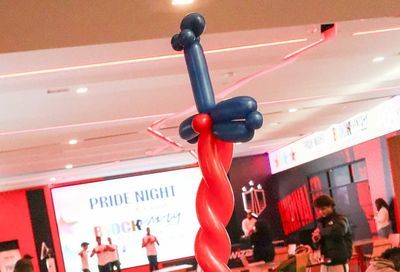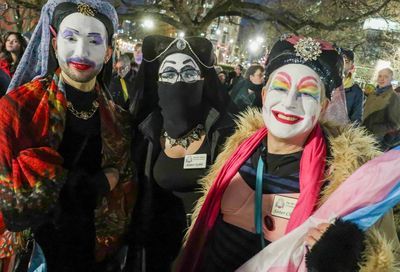Viva La Revolution!
The Washington Opera launches season with a stunning. lavish production of 'Andrea Chenier'
In staging Umberto Giordano’s twisted tale of the French Revolution, Andrea Chenier, Polish director Mariusz Trelinski pulls off an amazingly ambitious and yet always dramatically consistent feat. You will never look at Les Mis the same again — nor should you. When you see what opera can do with the same essential mood and material under the inspired hand of greatness, you can just leave Andrew Lloyd Webber to the tour buses.
Trelinski melds the past with the present seamlessly. Though the cast and chorus are costumed in at least symbolically historical wear, the sets they move through are schematic and contemporary in feel. Nevertheless, there is no incongruity between scenes dominated by a Dali-esque guillotine and those where a revolutionary sits in a leather office chair. Somehow it all works because Trelinski is fearless in his quest to explore the limits of expression within this complex score.
From the opening moment when we see a motionless, strangely-lit archetypal figure in the form of an 18th century servant, we are introduced to Trelinski’s spectacular visual style. And though he has punctuated this opera with his unique imagery, he stays utterly true to the music. Every aria, every duet, is given its visual and emotional space. Trelinski is as comfortable surprising us with a simulated homage to 21st century election-day celebrations (when the revolutionaries have taken control) as he is with crafting the subtle choreography and lighting intrinsic to a melancholy crie de couer. All told, this is among the most theatrically versatile and engaging productions the Washington Opera has ever staged.
But this is not just a big show — there is also an edge to the production. The cynicism of the story is echoed in some of the images and the libretto. In fact, the first minutes at opening night were rather seat-squirming as the above-mentioned servant sings of his disgust with the vagaries of rich old women. A quick pre-curtain survey of the audience put this opening in the category of biting the hand that feeds you. Nevertheless, a few titters rose from the audience. The conspicuous amount of firm female flesh bandied about before us also seemed planned — is it to entertain the male viewers or shame them? The subtexts here are many and subtle.
And then there is the singing. As the titular poet-soldier, Tenor Salvatore Licitra’s gorgeous voice is powerful and true in the upper register, deep and romantic in the lower notes. He simply doesn’t hold back, throwing himself at the notes without fear of the occasional uneven edge. There’s just too much gold here to care about the odd grain of sand. Though the libretto gives him little more than the usual clichés to create his character, Licitra provides the essential valor by virtue of his sound, skill and attitude. It’s the difference between good and great.
Licitra was so tremendous he actually caused some spontaneous applause in flagrant violation of that steely set of rules known as the “Opera Clapping Conventions. ” The subscription members near me were so outraged they must have suspected that plebes had infiltrated the Opera House and were ready to stage their own revolution. Heads wagged with such sanctimonious ferocity one feared the guillotine would be redundant.
But back to the singing. Though soprano Paoletta Marrocu’s acting, in the role of Chenier’s love interest Maddalenna, is on target from beginning to end, she seemed to need a little time to ease into her true vocal powers. By the second act she was at full speed, delivering a sublime performance as she defends her love for Chenier and prepares to die for it. Again, Trelinski’s directorial verve must be admired — in this last third of the opera, the action slows and the focus shifts to just two or three players, yet the pacing and intensity hang tight.
Adding to the spectacle is some great singing from Jorge Lagunes, playing Carlo Gerard, and avid revolutionary and Chenier’s rival for Maddalenna. Lagunes brings a stage-encompassing physicality to his role and a nicely-controlled passion in his voice.
Between Trelinski’s vision, the stupendous singing and the fine conducting of Eugene Kohn, this season has started off with something truly special. It’s time to join the revolution.
Support Metro Weekly’s Journalism
These are challenging times for news organizations. And yet it’s crucial we stay active and provide vital resources and information to both our local readers and the world. So won’t you please take a moment and consider supporting Metro Weekly with a membership? For as little as $5 a month, you can help ensure Metro Weekly magazine and MetroWeekly.com remain free, viable resources as we provide the best, most diverse, culturally-resonant LGBTQ coverage in both the D.C. region and around the world. Memberships come with exclusive perks and discounts, your own personal digital delivery of each week’s magazine (and an archive), access to our Member's Lounge when it launches this fall, and exclusive members-only items like Metro Weekly Membership Mugs and Tote Bags! Check out all our membership levels here and please join us today!



















